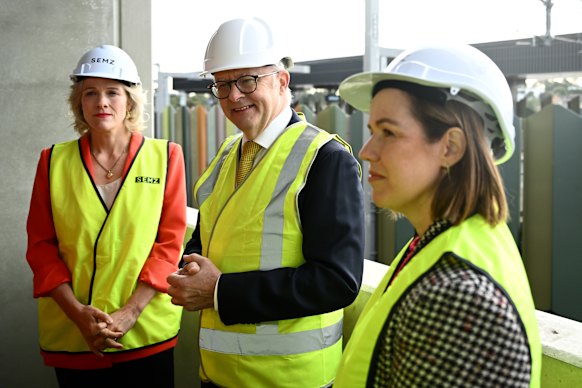
Housing Minister Clare O’Neil is set to prioritize housing issues during next week’s economic roundtable, aiming to address a significant backlog of home building approvals. Recent data indicates that homeownership is increasingly out of reach for many potential buyers, prompting the government to focus on reducing red tape in the construction sector rather than pursuing more contentious issues like tax reform.
O’Neil, alongside Environment Minister Murray Watt, will announce a $1.7 billion redevelopment of the historic Queen Victoria Market in Melbourne, which is expected to include a 49-level tower for student accommodation, a 46-level residential building, and a 28-level office space. The developer, Lendlease, was selected by the City of Melbourne in 2023 but has faced delays awaiting the necessary approvals to commence work on the heritage site.
According to a document from the Property Council of Australia, around 40,000 homes are currently stalled in the approval process. O’Neil emphasized the urgency of the situation, stating, “There are 40,000 homes somewhere stuck in that process, and that is way too many.”
She further highlighted the frustrations builders face, quoting one who remarked, “Clare, the really hard part about housing used to be building the house. Now it’s about approvals and bureaucracy.” O’Neil expressed her determination to tackle what she described as a “thicket of ridiculous regulation” affecting housing productivity.
Government’s Focus on Housing Productivity
The upcoming economic roundtable is anticipated to yield significant reforms aimed at expediting housing construction. O’Neil is optimistic that the discussions will lead to actionable solutions that enhance housing productivity, a critical issue given the growing concerns around affordability and accessibility in the housing market.
With a backdrop of rising home prices and stagnant wages, the government recognizes that immediate intervention in the construction process is essential. The proposed measures, if enacted, could have a profound impact on the housing landscape in Australia, potentially easing the burden on many aspiring homeowners.
As the Labor government navigates these complex challenges, it remains to be seen how effectively they can implement reforms that not only clear the backlog but also create a sustainable framework for future housing developments. The economic roundtable will serve as a pivotal moment for policymakers and stakeholders alike, with the hope of reinvigorating the housing sector and addressing the pressing needs of the population.






